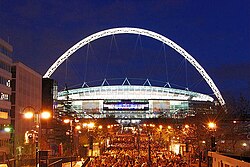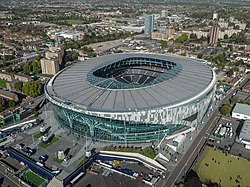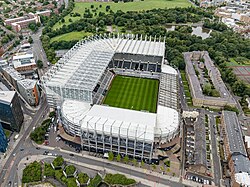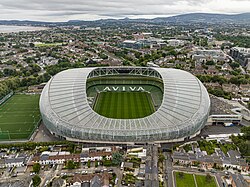UEFA Euro 2028
 From Wikipedia - Reading time: 12 min
From Wikipedia - Reading time: 12 min
 | |
| Tournament details | |
|---|---|
| Host countries | England Republic of Ireland Scotland Wales |
| Dates | 9 June – 9 July |
| Teams | 24 |
| Venue(s) | 9 (in 8 host cities) |
← 2024 2032 → | |
The 2028 UEFA Men’s European Football Championship, commonly referred to as UEFA Men’s Euro 2028 or simply Men’s Euro 2028, will be the 18th UEFA European Championship, the quadrennial international football championship. It will be co-hosted by England, Scotland, Wales and Republic of Ireland[1] and is projected to take place from 9 June to 9 July 2028.[2]
Spain are the defending champions after winning the 2024 final against England, one of the upcoming hosts.
Bid process
[edit]
On 23 March 2022, UEFA announced that three proposals had been received from countries declaring an interest in hosting the tournament: one from Russia, one from Turkey, and a joint bid by all five UEFA members from the British & Irish Isles including Northern Ireland.[3] Russia and Turkey were simultaneously bidding to host Euro 2032.
Russia submitted its bids despite the ongoing ban by UEFA on Russian clubs and national teams due to the country's invasion of Ukraine,[4][5][6][7][8] and in May 2022 its bids for both 2028 and 2032 were declared ineligible.[9][10][11] In early October 2023, Turkey withdrew its submission to focus on bidding for Euro 2032 together with Italy.[12]
The joint bid thus remained unopposed, and was selected unanimously on 10 October 2023 in Nyon, Switzerland,[13] meaning that the tournament would be organised by the Republic of Ireland and the four Home Nations of football, England, Northern Ireland, Scotland, and Wales. By late 2024, the proposed Northern Irish venue of Casement Park in Belfast was dropped, and it was confirmed that Northern Ireland would not host any games as originally planned, nor would it be eligible for automatic qualification.[14][15]
Euro 2028 will be the fifth European Championship since 2000 to take place in multiple nations. England will be hosting the tournament for the third time, having previously hosted Euro 1996 and eight matches (including the final) of the pan-European Euro 2020. Scotland will be doing so for the second time, after hosting four matches of Euro 2020. For the first time matches of the competition will be played in the Republic of Ireland and Wales. The Republic of Ireland was initially selected to host matches in Euro 2020, but due to COVID-19 restrictions it was removed as a host, as the country was unable to confirm spectators could attend [1].
Qualification
[edit]Per UEFA's bid regulations, the automatic qualification of the hosts can only be guaranteed for up to two host associations.[16] Therefore, UEFA decided that all four host teams (England, Republic of Ireland, Scotland and Wales) will enter qualifying, with two automatic spots held in reserve for hosts which fail to qualify via the group stage. Should more than two host teams fail to qualify, the spots will be decided based on qualifying ranking.[17]
A revised qualification format was confirmed by the UEFA Executive Committee in January 2023,[18] modified from the previous cycle, with the exact format confirmed in May 2025. The qualifying group stage will feature twelve groups of four or five teams. The winner of each group will qualify for the European Championship, along with the eight best-ranked runners-up. The four remaining runners-up, along with teams from the Nations League, will advance to the play-offs. The exact play-off format is dependent on how many of the host slots are used.[17]
Venues
[edit]
|
On 12 April 2023, ten host stadiums for the Euro 2028 bid were revealed, with the list being confirmed by UEFA on 10 October 2023.[19][20] Notable omissions include Anfield in Liverpool, which was ineligible to host games due to its pitch dimensions falling short of UEFA's requirements, and Old Trafford in Manchester, which was ruled out after Manchester United were unable to guarantee whether the stadium would be ready at that time.[21] Stadium of Light in Sunderland, London Stadium in London, Celtic Park and Ibrox Stadium in Glasgow, Murrayfield Stadium in Edinburgh and Croke Park in Dublin were also shortlisted, but were not chosen.[22][23] Villa Park in Birmingham was planned to be redeveloped in time for Euro 2028, which would see the stadium's capacity increase from 42,785 to 52,500.[24] In December 2023, the redevelopment plans were indefinitely postponed,[25] However, renewed plans were announced in April 2025, to redevelop Villa Park's North Stand, in order to raise the capacity to over 50,000 in time for Euro 2028.[26][27]
Casement Park in Belfast was also included in the bid instead of Northern Ireland's national football stadium, Windsor Park, as the latter does not have a capacity large enough to comply with UEFA rules for hosting European Championship matches.[28][29][30] With the redevelopment of Casement Park being delayed and budget increased, it was dropped as a host venue; thus the tournament will have nine stadiums.[14]
|
|
Broadcasting rights
[edit]UEFA
[edit]| Territory | Rights holders | Ref |
|---|---|---|
| Armenia | Armenia TV | [31] |
| Austria | ServusTV | [32] |
| Belgium | [33][34] | |
| Bosnia and Herzegovina | BHRT | [31] |
| Bulgaria | Nova | [35] |
| Croatia | HRT | [36] |
| Cyprus | CyBC | [37] |
| Czech Republic | [38] | |
| Denmark | [39][40] | |
| Estonia | Postimees | [41] |
| Finland | Yle | [42][43] |
| France | [44][45] | |
| Georgia | GPB | [31] |
| Germany | [46] | |
| Greece | ERT | [47][48] |
| Hungary | MTVA | [49] |
| Iceland | RÚV | [50] |
| Ireland | RTÉ | [31] |
| Israel | Charlton | [31] |
| Kosovo | Artmotion | [51] |
| Liechtenstein | SRG SSR | [52] |
| Malta | PBS | [31] |
| Moldova | TRM | [53] |
| Montenegro | Arena Sport | [31] |
| Netherlands | NOS | [54] |
| North Macedonia | Arena Sport | [31] |
| Norway | [55][56] | |
| Poland | TVP | [57] |
| Romania | Pro TV | [58] |
| Serbia | [31][59] | |
| Slovakia | TV Markíza | [60][61] |
| Slovenia | [31] | |
| Spain | RTVE | [62] |
| Sweden | [63][64][65] | |
| Switzerland | SRG SSR | [52] |
| United Kingdom | [66] |
Rest of the world
[edit]| Territory | Rights holders | Ref |
|---|---|---|
| Canada | TVA Sports | [67] |
| Caribbean | C Sport | [68] |
| Central America | ESPN | [31][69] |
| China | iQIYI | [31] |
| Indian subcontinent | Sony Sports Network | [70] |
| Indonesia | MNC Media | [71] |
| New Zealand | TVNZ | [72] |
| Pacific Islands | Digicel | [31] |
| South America | ESPN | [31][69] |
| South Korea | CJ ENM | [31] |
| Sub-Saharan Africa |
|
[73][74] |
| Mexico | [75] | |
| United States | [76][77][78] |
Sponsorship
[edit]Official global sponsors[79]
References
[edit]- ^ UEFA.com (10 October 2023). "UEFA EURO 2028 and 2032 hosts confirmed | UEFA EURO 2024". UEFA. Retrieved 10 January 2024.
- ^ "EURO 2028: All you need to know". Union of European Football Associations. 12 July 2024. Retrieved 12 July 2024.
- ^ "Declarations of interest in hosting UEFA EURO 2028 and 2032 received from four potential bids" (Press release). Nyon: UEFA. 23 March 2022. Retrieved 23 March 2022.
- ^ Brown, Luke. "Euro 2028: Russia to rival UK and Ireland for tournament despite football ban". The New York Times. Retrieved 12 March 2024.
- ^ "Russia intends to bid for Euros as invasion of Ukraine continues: UEFA reacts to the move". SportingNews.com. 23 March 2022. Retrieved 12 March 2024.
- ^ MacInnes, Paul (23 March 2022). "Russia warned by Uefa it could face more sanctions if it bids to host Euros". The Guardian. ISSN 0261-3077. Retrieved 12 March 2024.
- ^ PA (24 March 2022). "Russia wants to host Euro 2028 or 2032 despite international ban". SportsPro. Retrieved 12 March 2024.
- ^ "Football: Russia to bid to host Euro 2028 or 2032 despite ban". The Straits Times. 24 March 2022. ISSN 0585-3923. Retrieved 12 March 2024.
- ^ UEFA.com (2 May 2022). "UEFA decisions for upcoming competitions relating to the ongoing suspension of Russian national teams and clubs". UEFA. Retrieved 12 March 2024.
- ^ "Russia handed further sanctions by Uefa". BBC Sport. Retrieved 12 March 2024.
- ^ "UEFA bans Russia bid to host Euro 2028, 2032". ESPN.com. 2 May 2022. Retrieved 12 March 2024.
- ^ Rathborn, Jack (4 October 2023). "UK and Ireland set to host Euro 2028 after Turkey withdraw bid". The Independent.
- ^ "Hosts appointed for UEFA EURO 2028 and 2032". Nyon: UEFA. 10 October 2023. Retrieved 12 October 2023.
- ^ a b "Casement Park: IFA disappointed but accepts decision - CEO Patrick Nelson". BBC Sport. 16 September 2024.
- ^ "NI will not have automatic Euro 2028 spot – FAI". BBC Sport. 26 November 2024. Retrieved 27 November 2024.
- ^ "UEFA announces bidding process for potential UEFA EURO 2028 hosts". UEFA. Union of European Football Associations. 12 October 2021. Retrieved 13 October 2021.
- ^ a b "UEFA Euro 2028 qualification system approved". UEFA.com. Union of European Football Associations. 21 May 2025. Retrieved 21 May 2025.
- ^ "New formats for UEFA men's national team competitions approved". UEFA. 25 January 2023. Retrieved 26 January 2023.
- ^ "Euro 2028: Casement Park and Everton's Bramley-Moore Dock among 10 stadiums for UK & Ireland bid". BBC Sport. 12 April 2023. Retrieved 10 October 2023.
- ^ "Hosts appointed for UEFA EURO 2028 and 2032". UEFA. Union of European Football Associations. 10 October 2023. Retrieved 10 October 2023.
- ^ "Euro 2028 stadiums: Why Anfield and Old Trafford will not host any games". Give Me Sport. 10 October 2023. Retrieved 10 October 2023.
- ^ "Euro 2028: Casement Park and Everton's Bramley-Moore Dock among 10 stadiums for UK & Ireland bid". BBC Sport.
- ^ Bosher, Luke. "UK and Ireland announce final list of stadiums for Euro 2028 bid". The Athletic.
- ^ "Villa Park redevelopment plans could increase seating to more than 50,000". ITV News. 15 December 2022. Retrieved 22 December 2022.
- ^ Townley, John (19 December 2023). "Chris Heck delivers major Villa Park update as Aston Villa development paused". Birmingham Live. Retrieved 21 February 2024.
- ^ "Aston Villa announce redevelopment of the iconic North Stand". Aston Villa Football Club. 24 April 2025. Retrieved 24 April 2025.
- ^ "Aston Villa announce plans to increase Villa Park capacity to over 50,000". BBC Sport. 24 April 2025. Retrieved 24 April 2025.
- ^ "O'Neill urges NI fans to get behind Casement Park plans". RTÉ.ie. 16 October 2023.
- ^ "Will controversial Casement Park be ready for Euro 2028?". BBC Sport. Retrieved 9 November 2023.
- ^ "'We have to get our heads around' NI at Casement". BBC Sport. 4 October 2023. Retrieved 9 November 2023.
- ^ a b c d e f g h i j k l m n o "ISO UEFA EURO 2028" (PDF). 23 May 2024. Retrieved 6 February 2025.
- ^ "UEFA EURO 2024, UEFA EURO 2028 und European Qualifiers LIVE bei ServusTV!". Servus TV. April 2021. Archived from the original on 18 April 2024. Retrieved 1 April 2021.
- ^ "Les Diables sur la RTBF jusqu'en 2028!". rtbf.be. 12 July 2021. Retrieved 23 July 2021.
- ^ "Kijk deze zomer en de komende jaren naar het EK voetbal". Sporza. 29 April 2021. Retrieved 27 May 2021.
- ^ "Nova Broadcasting Group secures broadcasting rights to UEFA EURO 2024 and UEFA EURO 2028". Nova. 17 February 2022. Retrieved 17 February 2022.
- ^ "Vrhunski nogomet i dalje u programu Hrvatske radiotelevizije!". sport.hrt.hr. HRT. Retrieved 23 May 2022.
- ^ "Μεγάλες αθλητικές διοργανώσεις από το ΡΙΚ". CyBC. 14 November 2022. Retrieved 1 February 2023.
- ^ "Reprezentační fotbal bude do roku 2028 na České televizi, práva má na další dvě Eura". sport.ceskatelevise.cz. 8 October 2021. Retrieved 11 October 2021.
- ^ "Herrelandsholdets kampe vises fra 2022 igen på TV2" (in Danish). DBU. Retrieved 10 September 2020.
- ^ Svenson, David (10 September 2020). "TV2 Denmark dislodges Discovery by acquiring all Uefa national team rights". SportBusiness. Retrieved 10 September 2020.
- ^ "Duo Media secures Estonia broadcasting rights for Euro 2028 football". ERR. ERR. Retrieved 6 February 2025.
- ^ "Yle varmistaa jalkapallon huippuhetkiä kaikkien saataville – Huuhkajien ottelut ja EM-lopputurnaukset Ylellä vuoteen 2028" (in Finnish). Yle. Retrieved 23 September 2020.
- ^ Ross, Martin (23 September 2020). "YLE regains Finnish national team rights in six-year Uefa deal". SportBusiness. Retrieved 23 September 2020.
- ^ "EVENEMENT : LE GROUPE TF1 DE NOUVEAU PARTENAIRE EXCLUSIF DES BLEUS JUSQU'EN 2028 !". TF1. 22 July 2022. Retrieved 9 October 2023.
- ^ "Euro 2024 : L'UEFA Euro 2024™ et l'UEFA Euro 2028™ diffusés en intégralité sur beIN SPORTS !". beIN Sports. 7 June 2024. Retrieved 7 June 2024.
- ^ "ARD und ZDF übertragen die UEFA EURO 2028". ZDF-Presseportal (in German). ZDF. Retrieved 6 February 2025.
- ^ "Οι διοργανώσεις UEFA EURO 2024 και UEFA EURO 2028 αποκλειστικά στην ΕΡΤ". ERT. 1 December 2021. Retrieved 11 November 2023.
- ^ "Η ΕΡΤ «κατέκτησε» το Euro 2024 και το Euro 2028". Newsbeast.gr (in Greek). 5 February 2021. Retrieved 14 July 2021.
- ^ "Újabb történelmi bejelentés: 2028-ig az M4 Sport a magyar labdarúgó-válogatott és a következő két Eb kizárólagos otthona". m4sport.hu (in Hungarian). MTVA. 15 November 2021. Retrieved 18 November 2021.
- ^ Örn Jónsson, Einar (2 June 2021). "EM í fótbolta 2024 og 2028 á RÚV". RÚV (in Icelandic). Retrieved 25 March 2021.
- ^ "Kosova, Nations League, Kampionatet Evropiane, Kualifikimet për Botërorin dhe Ndeshjet Miqesore në Futboll i Bashkohen Familjes ARTMOTION" (in Albanian). Artmotion. Archived from the original on 25 June 2022. Retrieved 17 June 2022.
- ^ a b "Nationalmannschafts-Fussball bis 2028 bei der SRG". srgssr.ch. 24 June 2021. Retrieved 24 June 2021.
- ^ "Teleradio-Moldova a încheiat un acord cu UEFA care îi permite să transmită în următorii 5 ani meciurile echipei naţionale de fotbal şi două campionate europene de fotbal". TRM. 16 November 2023. Retrieved 17 November 2023.
- ^ "Ook EK voetbal in 2028 bij de NOS te zien, net als Oranje de komende vier jaar". NOS. 2 July 2024. Retrieved 2 July 2024.
- ^ Skjerdingstad, Anders (7 September 2020). "NRK og TV 2 sikret nye rettigheter – skal vise fotball-EM til 2028" (in Norwegian Bokmål). NRK. Retrieved 9 September 2020.
- ^ Svenson, David (8 September 2020). "TV2, NRK secure Uefa national team rights in long-term deal". SportBusiness. Retrieved 10 September 2020.
- ^ "Mecze reprezentacji Polski do 2028 roku w Telewizji Polskiej. W tym Euro 2024 i Euro 2028!". TVP (in Polish). 23 March 2021. Retrieved 23 March 2021.
- ^ Boerescu, Gabriela (11 July 2021). "PRO TV anunță achiziționarea drepturilor de difuzare pentru UEFA EURO 2024 și 2028!". Pro TV (in Romanian). Retrieved 12 July 2021.
- ^ "Vest koja će obradovati sve navijače: Cela Srbija će od sada MOĆI DA GLEDA fudbalsku reprezentaciju". Blic (in Serbian). sport.blic.rs. 24 March 2022. Retrieved 24 March 2022.
- ^ "Skupina Markíza získala exkluzívne vysielacie práva na futbalové EURO 2024 a EURO 2028". tvnoviny.sk. TV Noviny. Retrieved 17 November 2021.
- ^ "EURO 2024 a 2028 nebudú na RTVS. Vysielacie práva získala iná televízia". SME (in Slovak). 16 November 2021. Retrieved 16 November 2021.
- ^ "RTVE emitirá la Eurocopa 2028". RTVE.es (in European Spanish). RTVE. Retrieved 6 February 2025.
- ^ "Fotbolls-EM 2024 och 2028 – direkt i SVT och TV4". SVT. 10 November 2020.
- ^ "Mästerskapssomrarna fortsätter på TV4 - säkrar rättigheter till fotbolls-EM 2024 och 2028". TV4.
- ^ Ross, Martin (10 November 2020). "TV4 and SVT retain Uefa European Championships rights". SportBusiness. Retrieved 10 November 2020.
- ^ "The BBC and ITV to show UEFA Euro 2024 and UEFA Euro 2028". BBC. 9 November 2022. Retrieved 9 November 2022.
- ^ "L'EURO DE RETOUR À TVA SPORTS". 19 December 2022. Retrieved 23 December 2022.
- ^ "CSport Channels Kickoff with Premier League". 26 July 2022. Retrieved 1 August 2022.
- ^ a b "ESPN trae el sábado 2 el sorteo de la UEFA EURO 2024 por STAR+". ESPN. 30 November 2023. Retrieved 7 December 2023.
- ^ Mahadik, Gauresh (11 April 2023). "Sony Sports Network signs renewal with UEFA". Sports Mint. Retrieved 11 April 2023.
- ^ Arie Harnoko, Rizqi (12 May 2023). "MNC Group Amankan Hak Siar Euro 2024 dan Euro 2028, Cetak Rekor 9 Edisi Nonstop Sejak 1996". KabarRakyat.ID (in Indonesian). Retrieved 13 May 2023.
- ^ "Spark Sport closure". 30 June 2023. Retrieved 7 December 2023.
- ^ "New World TV diffuseur officiel de l'UEFA pour six saisons". New World TV. 16 March 2022. Retrieved 1 December 2023.
- ^ "New World TV lands Uefa national team rights in long-term deal". Sportcal. 7 January 2022. Archived from the original on 8 January 2022. Retrieved 8 January 2022.
- ^ "¿Cuánto cuesta Izzi y SKY? Precios, promociones y paquetes para ver la Eurocopa 2024". 14 June 2024. Retrieved 17 June 2024.
- ^ "FOX Sports Scores Media Rights to UEFA European Championship in Landmark Deal". 3 November 2021. Archived from the original on 11 March 2022. Retrieved 3 November 2021.
- ^ "fuboTV Acquires Exclusive Rights to Select UEFA National Team Football and UEFA European Championship Matches Through FOX Sports". Business Wire. 24 January 2022. Retrieved 25 January 2022.
- ^ "TelevisaUnivision Announces Expansive Sports Offering in 2024". TelevisaUnivision. 16 May 2023. Retrieved 16 May 2023.
- ^ Sim, Josh (21 March 2025). "Uefa taps Carlsberg as national team partner". SportsPro. Archived from the original on 23 March 2025. Retrieved 23 March 2025.
The Danish beer company joins Adidas, Alipay, Atos, Hisense and Visit Qatar as Uefa's national team sponsors.
 KSF
KSF








